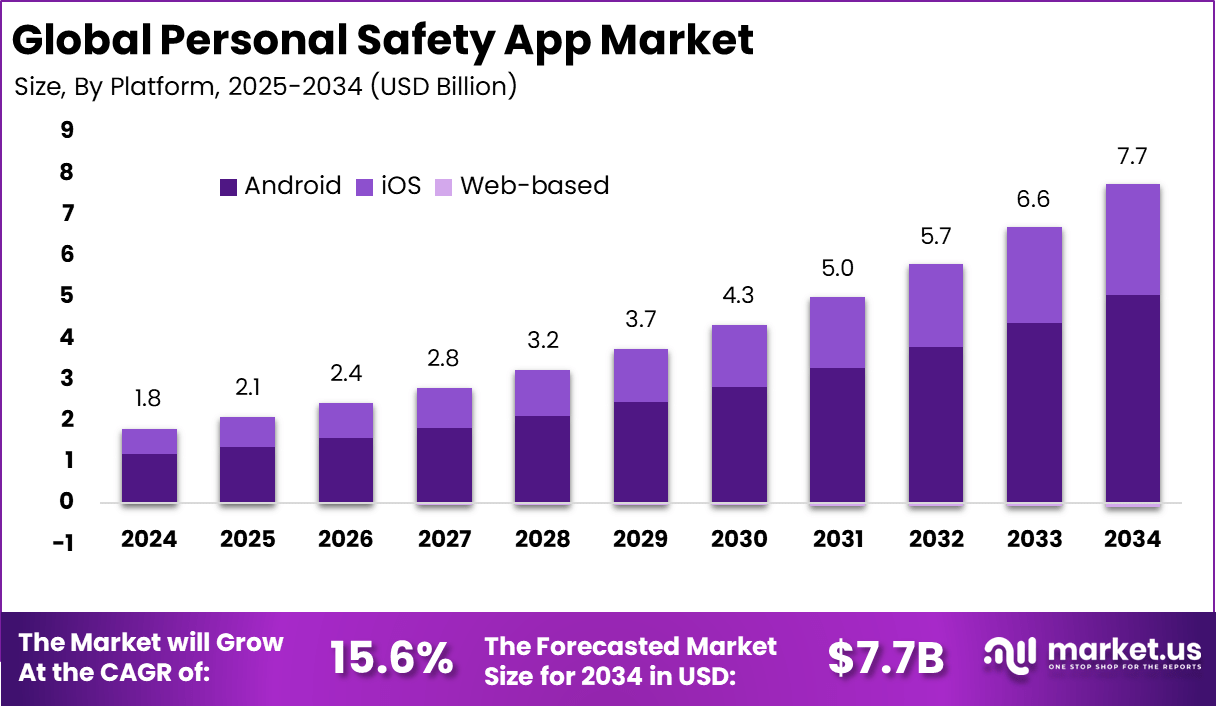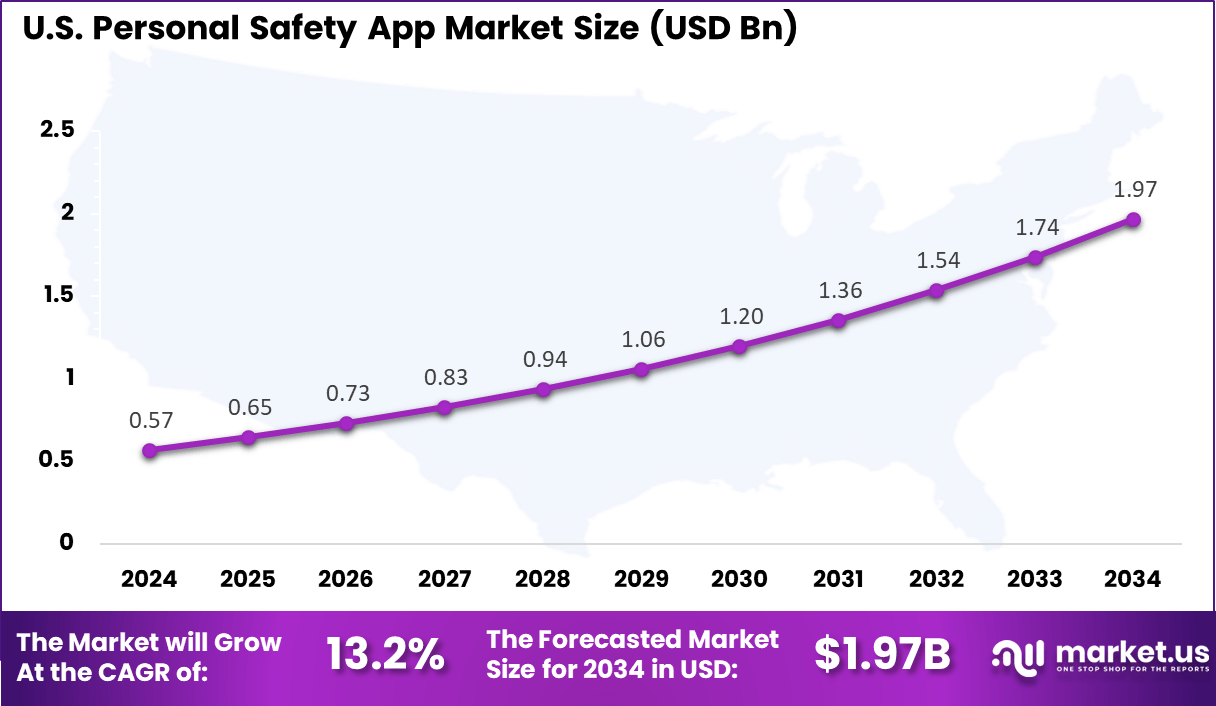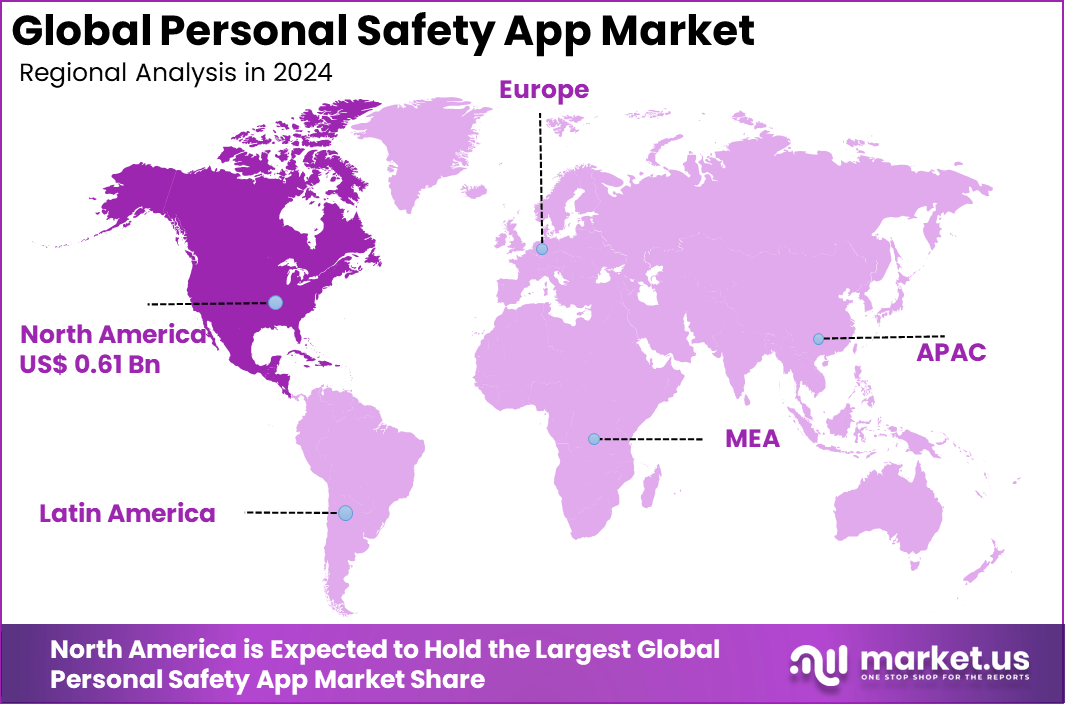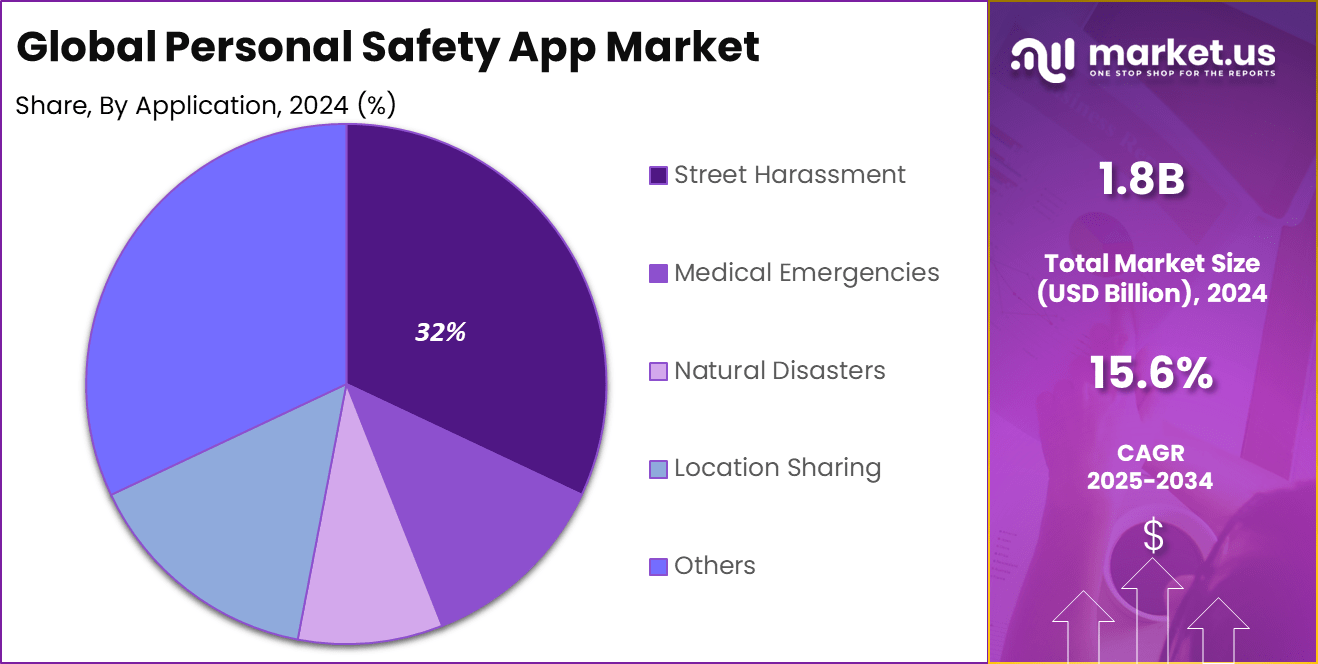Global Personal Safety App Market Size, Share Analysis Report By Platform (Android, Ios, Web-based), By Application (Street Harassment, Medical Emergencies, Natural Disasters, Location Sharing, Others), Region and Companies - Industry Segment Outlook, Market Assessment, Competition Scenario, Trends and Forecast 2025-2034
- Published date: July 2025
- Report ID: 152038
- Number of Pages: 261
- Format:
-
keyboard_arrow_up
Quick Navigation
Report Overview
The Global Personal Safety App Market size is expected to be worth around USD 7.7 billion by 2034, from USD 1.8 billion in 2024, growing at a CAGR of 15.6% during the forecast period from 2025 to 2034. In 2024, North America held a dominant market position, capturing more than a 34% share, holding USD 0.61 billion in revenue.
The Personal Safety App Market refers to mobile-based software solutions designed to protect individuals by offering features such as real-time location sharing, emergency alerts, automated response, and threat detection. These applications leverage smartphone sensors, GPS, communication networks, and increasingly AI capabilities to deliver timely assistance to users during security threats, emergencies, or emergencies involving health.
The top driving factors for this market have been the intensifying concern over personal security, especially in urban environments, combined with pervasive smartphone adoption. A remarkable increase in crime rates, street harassment, and the unpredictability of emergencies has prompted individuals and caregivers to seek digital safety solutions.

The increasing adoption of technologies such as AI-driven threat detection, geofencing, live video/audio streaming, and integration with wearables is reshaping the market. Developers are incorporating location precision, predictive safety alerts, machine learning for anomaly detection, and seamless connection with devices like smartwatches and fitness trackers.
There are key reasons for adoption that resonate with users: the ability to instantly alert trusted contacts or authorities, provide accurate real‑time location information, and get proactive warnings before a situation escalates. Integration with community networks and automated emergency response enhances sense of safety and reduces anxiety in vulnerable groups.
For instance, in March 2021, Truecaller launched its Guardians app, a personal safety solution specifically designed for women. The app allows users to quickly alert trusted contacts in case of an emergency, share their real-time location, and trigger an immediate safety response. By leveraging Truecaller’s existing platform, the app offers a user-friendly interface and integrates with other digital safety tools, making it a reliable solution for enhancing personal security.
Key Takeaway
- The market is expected to grow from USD 1.8 billion in 2024 to USD 7.7 billion by 2034, registering a strong CAGR of 15.6%, fueled by growing concerns over public safety, especially among women, children, and the elderly.
- North America led the global market with over 34% share in 2024, generating around USD 0.61 billion in revenue. The region’s lead is supported by widespread smartphone penetration, safety awareness campaigns, and proactive user adoption.
- The U.S. market alone contributed USD 0.57 billion in 2024 and is projected to grow at a CAGR of 13.2%, driven by rising demand for emergency alert systems, location tracking, and integration with law enforcement networks.
- By platform, Android dominated with a 66% share, owing to its global user base, flexible app development ecosystem, and affordability across emerging markets.
- In terms of application, Street Harassment was the leading use case in 2024, holding a 32% share, as real-time alert features, quick-access SOS buttons, and community-based reporting tools gain traction for personal security in public spaces.
U.S. Market Size
The market for Personal Safety App within the U.S. is growing tremendously and is currently valued at USD 0.57 billion, the market has a projected CAGR of 13.2%. The U.S. market for personal safety apps is experiencing significant growth, driven by growing concerns about personal security, the widespread adoption of smartphones, and an increasing demand for real-time safety solutions across various user segments, including travelers, students, and professionals.
For instance, in October 2025, a notable development in the U.S. personal safety app market was the spotlight on eBodyGuard, a revolutionary application transforming community protection and digital security. Melissa Faith Hart, Founder and CEO, discussed the app’s impact on Good Morning Washington, highlighting how eBodyGuard provides critical emergency information to first responders and supports vulnerable populations such as the elderly and victims of domestic violence.

In 2024, North America held a dominant market position in the Global Personal Safety App Market, capturing more than a 34% share, holding USD 0.61 billion in revenue. This dominance is due to various factors, including widespread smartphone usage, advanced technology, and mounting concerns about personal safety.
The region’s tech-savvy population is quick to adopt innovative solutions like real-time GPS tracking and AI-driven safety features. Moreover, the growing demand for personal safety applications among diverse groups, such as students, professionals, and travelers, reinforces North America’s position as a leader in this area.
For instance, in September 2024, Evolv Technology unveiled its High-Speed Weapons Detection System for bags, along with an integrated Personal Safety App, aiming to enhance security across various locations in North America. The system, designed for rapid detection and response, is poised to revolutionize safety protocols at public venues, providing a seamless and efficient solution for protecting individuals in high-traffic environments.

Platform Analysis
In 2024, the Android segment held a dominant market position, capturing a 66% share of the Global Personal Safety App Market. The global user base of Android has contributed to its dominance, particularly in developing countries where cost-effectiveness and availability are key factors.
Additionally, the platform’s open-source feature enables greater customization and the incorporation of multiple safety features, which enhances its appeal to both developers and users. For Instance, in December 2023, Google introduced a range of safety features to all Android phones, further enhancing the Personal Safety App.
These updates include advanced emergency alerts, real-time location sharing, and improved crash detection, ensuring that users can stay safe and receive timely assistance in critical situations. This expansion of safety features is part of Google’s ongoing commitment to enhancing the security and well-being of its global user base.
Application Analysis
In 2024, the Street Harassment segment held a dominant market position, capturing a 32% share of the Global Personal Safety App Market. Increasing demand within this industry has been largely due to growing concerns about personal safety, particularly for women living in urban areas.
A growing awareness of social issues like harassment and violence, along with the need for efficient support tools, has led to the widespread use of applications that offer real-time notifications, GPS tracking, and emergency reporting. For instance, in December 2024, Mitie partnered with WALKSAFE to address growing concerns about street harassment and personal safety, particularly after dark.
This collaboration aims to provide real-time support and safety monitoring for individuals, empowering users to feel more secure while walking in urban environments. The partnership leverages advanced technology to offer immediate assistance and location tracking, reflecting a growing trend toward using digital solutions to combat street harassment.

Key Market Segments
By Platform
- Android
- iOS
- Web-based
By Application
- Street Harassment
- Medical Emergencies
- Natural Disasters
- Location Sharing
- Others
Key Regions and Countries
- North America
- US
- Canada
- Europe
- Germany
- France
- The UK
- Spain
- Italy
- Russia
- Netherlands
- Rest of Europe
- Asia Pacific
- China
- Japan
- South Korea
- India
- Australia
- Singapore
- Thailand
- Vietnam
- Rest of Latin America
- Latin America
- Brazil
- Mexico
- Rest of Latin America
- Middle East & Africa
- South Africa
- Saudi Arabia
- UAE
- Rest of MEA
Drivers
Smartphone Penetration
The widespread availability and affordability of smartphones have facilitated the rapid adoption of personal safety applications. The growing popularity of smartphones, particularly in developing countries, is driving the demand for safety applications.
The demand for these applications is fueled by the ability of these gadgets to function as convenient, mobile platforms, providing users with immediate safety features like GPS monitoring, emergency notifications, and instant messaging.
For instance, in February 2025, safety organizations and community leaders in Malaysia encouraged smartphone users, especially in developing regions, to adopt personal safety apps like Life360, Red Panic Button, mySpy, Eyezy, Spynger, and Kitestring. These applications help users track real-time locations, send emergency alerts instantly, and notify contacts automatically if a check-in is missed, thereby reducing safety risks and enabling faster response in emergencies.
Restraint
Technological and Connectivity Barriers
Personal safety applications may face limitations due to connectivity issues and technological difficulties, particularly in low-network or rural areas. Such applications often rely on real-time GPS and internet access, which may not be reliable in certain areas, diminishing their reliability and effectiveness. Furthermore, a few individuals may not possess the necessary technical expertise or self-restraint to operate these applications, leading to obstacles in their acceptance among less tech-savvy individuals.
For instance, in May 2025, in Ferighat, a remote area of the north-eastern district of Sunamganj, stationery shop owner Md Sumon Mia faces a daily challenge that millions of rural Bangladeshis encounter: the struggle for a reliable internet connection. This issue, which highlights technological and connectivity barriers, significantly impacts the ability of people in rural areas to access digital services, including personal safety apps, limiting their full potential and usage.
Opportunities
Integration with Wearables and IoT
The combination of personal safety applications with wearable technology, such as smartwatches and fitness trackers, presents a significant opportunity for growth. The demand for these devices is increasing, allowing for real-time data collection and enhanced features.
By connecting with safety applications, these wearables can provide users with immediate notifications and proactive measures to protect themselves, which enhances the app’s broader user base. For instance, in May 2025, STMicroelectronics introduced a miniature AI-enabled sensor that combines activity tracking and high-impact sensing, revolutionizing personal safety applications in wearables and IoT devices.
This integration allows for real-time monitoring of physical activity and immediate detection of high-impact events, such as falls or accidents. By embedding this technology into wearables like smartwatches or fitness trackers, personal safety apps can provide more accurate and timely alerts, enhancing overall safety for users in various environments.
Challenges
User Trust and Adoption
The success of personal safety applications hinges on the ability to trust users. It is important for users to have faith in the app’s ability to provide reliable, timely assistance and safeguard personal data. The app’s adoption may be impeded by concerns about privacy, data security, or its functionality. To increase the usage of these applications, it is crucial to promote transparency, safeguard user data, and provide consistent positive user experiences.
For instance, in May 2025, a data breach involving Life360, a widely used personal safety app, exposed the data of 442,000 users, sparking significant concerns over API vulnerabilities. Experts have raised alarms about the security risks associated with app APIs, emphasizing the importance of robust data protection mechanisms. This breach underscores the critical need for stronger cybersecurity protocols in personal safety apps to protect sensitive user information from unauthorized access and potential misuse.
Latest Trends
The adoption of real-time monitoring and automated responses has become a significant factor in personal safety applications, particularly among urban residents, millennials, and Gen Z. These applications offer real-time GPS tracking, live location sharing, and automatic emergency notifications, providing immediate aid and clarity in urgent situations.
This feature enables users to notify their friends and family as soon as possible, which enhances safety measures and expedites response times. These features are becoming more prevalent, and personal safety apps are being recognized as crucial resources by people who prioritize proactive security in their daily routines.
For instance, in June 2025, Watch Over Me, a leading personal safety app, continued to enhance its offerings by integrating advanced GPS tracking, emergency alerts, and community-driven support features. Designed with user safety in mind, especially for women, it allows users to send alerts with their real-time location to trusted contacts, ensuring immediate help when needed.
Key Players Analysis
The personal safety app market is marked by the active presence of platforms such as Life360, bSafe, and Noonlight, which have gained traction for their real-time location tracking, emergency response features, and user-friendly interfaces. These companies are continuously upgrading their service capabilities with AI-based alerts and automatic crash detection. Their adoption has been particularly strong among families and individuals in urban environments.
Other important players include Safe365, Red Panic Button, and SafeTrek, which have been widely adopted in regions with increasing safety awareness. These apps emphasize quick access to emergency contacts, law enforcement, or personal guardians with minimal effort. Many of them are compatible with wearables and smartphones, supporting voice commands and silent alerts.
Startups such as Watch Over Me, One Scream, SOS Stay Safe, Citizen, Kitestring, and others are also playing a key role. These apps offer specialized features like scream recognition, inactivity checks, and customizable alert systems. Their market differentiation lies in niche targeting, such as solo travelers, women, and elderly users. Innovation in low-bandwidth operation and integration with local emergency services is helping these apps secure user trust.
Top Key Players in the Market
- Life360
- bSafe
- Noonlight
- Safe365
- Red Panic Button
- SafeTrek
- Watch Over Me
- One Scream
- SOS Stay Safe
- Citizen
- Kitestring
- Others
Recent Developments
- In June 2025, One Scream, an innovative personal safety app, gained attention for its unique voice-activated features designed to enhance personal security. The app runs in the background of a device, automatically detecting screams and triggering an immediate response by recording audio and notifying emergency contacts.
- In June 2025, the World Emergency Association highlighted the top personal safety apps of the year, featuring solutions like Noonlight, Life360, and bSafe for their advanced features, including real-time tracking, emergency alerts, and integration with smart devices.
Report Scope
Report Features Description Market Value (2024) USD 1.8 Bn Forecast Revenue (2034) USD 7.7 Bn CAGR (2025-2034) 15.6% Base Year for Estimation 2024 Historic Period 2020-2023 Forecast Period 2025-2034 Report Coverage Revenue forecast, AI impact on market trends, Share Insights, Company ranking, competitive landscape, Recent Developments, Market Dynamics and Emerging Trends Segments Covered By Platform (Android, Ios, Web-based), By Application (Street Harassment, Medical Emergencies, Natural Disasters, Location Sharing, Others) Regional Analysis North America – US, Canada; Europe – Germany, France, The UK, Spain, Italy, Russia, Netherlands, Rest of Europe; Asia Pacific – China, Japan, South Korea, India, New Zealand, Singapore, Thailand, Vietnam, Rest of Latin America; Latin America – Brazil, Mexico, Rest of Latin America; Middle East & Africa – South Africa, Saudi Arabia, UAE, Rest of MEA Competitive Landscape Life360, bSafe, Noonlight, Safe365, Red Panic Button, SafeTrek, Watch Over Me, One Scream, SOS Stay Safe, Citizen, Kitestring, Others. Customization Scope Customization for segments, region/country-level will be provided. Moreover, additional customization can be done based on the requirements. Purchase Options We have three license to opt for: Single User License, Multi-User License (Up to 5 Users), Corporate Use License (Unlimited User and Printable PDF)  Personal Safety App MarketPublished date: July 2025add_shopping_cartBuy Now get_appDownload Sample
Personal Safety App MarketPublished date: July 2025add_shopping_cartBuy Now get_appDownload Sample -
-
- Life360
- bSafe
- Noonlight
- Safe365
- Red Panic Button
- SafeTrek
- Watch Over Me
- One Scream
- SOS Stay Safe
- Citizen
- Kitestring
- Others













